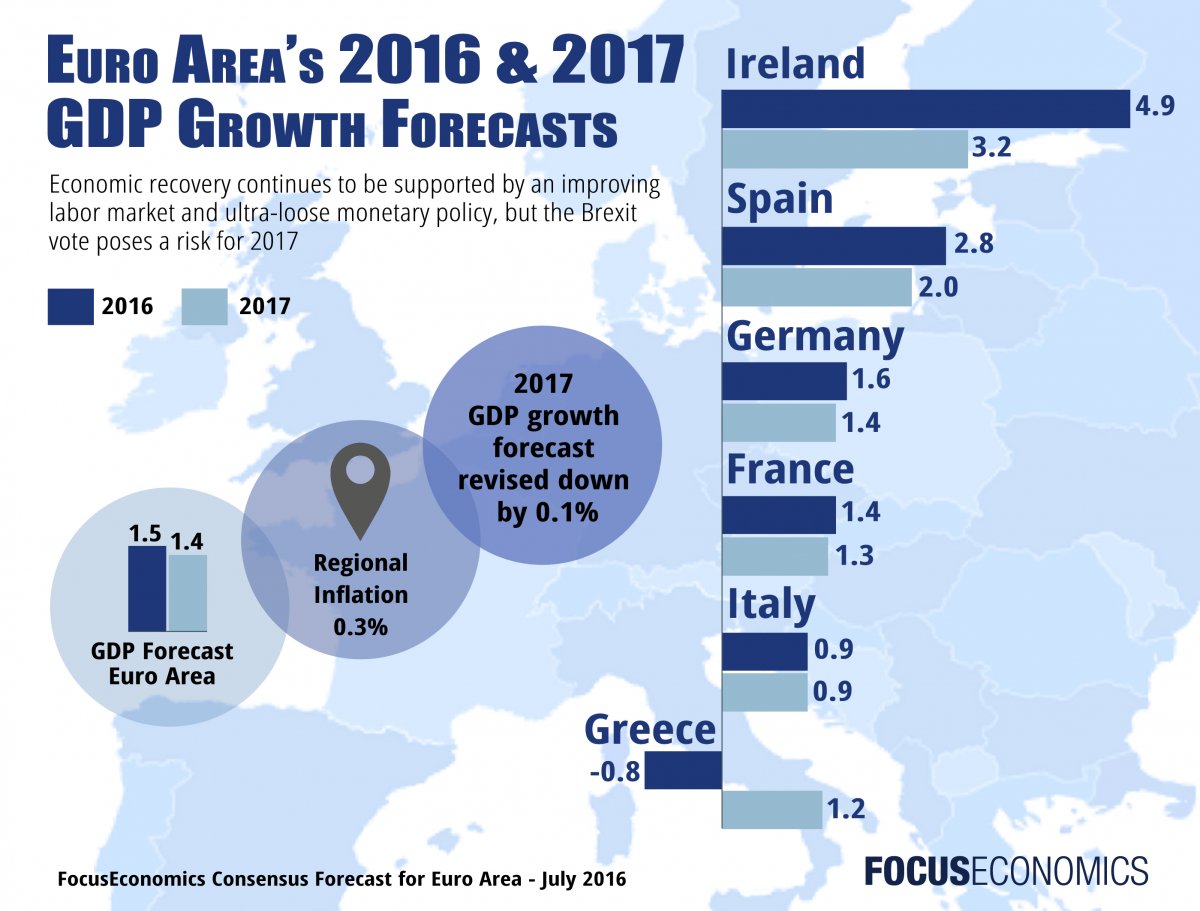What are the experts saying?
According to FocusEconomics’ latest survey of 50 leading economic institutions, the long-term Eurozone growth outlook doesn’t look great. The Eurozone economy is expected to slow down in 2017 as contagion from Brexit hits the region.
Due to a strong first quarter GDP reading and the long timeline for Brexit rollout, economists project 2016 GDP expanding 1.5%, which is unchanged from the pre-Brexit forecast. It seems that for the time being everyone can breathe a sigh of relief, however, the big news is that our latest FocusEconomics survey on the Eurozone economy forecasts 2017 growth at just 1.4%, which represents a cut of 0.1 percentage points from the pre-Brexit estimate last month.
Click the infographic to open a full-sized version
“Prior to the vote, economists had considered the region’s recovery to be firmly on track as steady domestic demand had fueled growth in the first quarter of the year and the bloc had showed resilience to external headwinds. In the aftermath of the decision, analysts have significantly altered their forecasts for the Eurozone economy and many of its constituent countries,” says Angela Bouzanis, Senior Economist at FocusEconomics.
These numbers may seem fairly optimistic to some, however, Danske Bank is much more pessimistic in its expectations for the Eurozone’s economic growth in 2016 and 2017, forecasting just 1.2% and 0.7% respectively.
According to Pernille Bomholdt Henneberg, Senior Analyst at Danske Bank, “We expect a very negative impact on overall sentiment and especially on business confidence, which is likely to result in lower investments. A long period of negotiations may drag out the uncertainty, but the biggest impact should be seen in a sharp deterioration in H2 16, where we expect the euro area to be in technical recession.”
BNP Paribas is also operating on the same wavelength as Danske Bank, albeit a bit more optimistic. They’ve substantially revised down their Eurozone forecasts and now project growth of 1.4% (down from 1.5% pre-Brexit) and 0.9% (down from 1.3%) in 2016 and 2017, respectively.
Group Chief Economist at BNP Paribas, William De Vijlder commented, “The negative effect of market uncertainty and the tightening of monetary conditions on GDP is harder to pinpoint, but based on past stress events, we would estimate it at about 0.4% over two years. Eurozone GDP is, therefore, likely to be 0.5% lower than we had envisaged in our central ‘pre-Brexit’ scenario for 2016-17, with the bulk of the hit likely to come in 2017.“
What will Brexit hit the hardest?
The most direct channel of economic pain will be felt across the Channel via trade linkages, since the UK is the Eurozone’s largest trading partner. Except for Ireland, the UK has a trade deficit with all major Eurozone economies and in the near term, we expect reduced demand from the UK amid a Brexit-fueled slowdown to hurt Euro area goods. The long-term outlook, however, will be contingent on what kind of trade model the UK and the EU agree on.
In terms of the specific Eurozone economies, we believe the extent of the economic impact will be divergent across countries with Belgium, Ireland and the Netherlands among the hardest hit.
With our latest round of Eurozone forecasts almost half of the economies in the Eurozone region were revised down. Our 2016 GDP projections for 8 of the 19 countries in the region were revised down, including big guns France and Italy. Meanwhile, forecasts were left unchanged for 8 countries including Spain and Germany. None were revised up.
Where do we all go from here?
It has to be said that it is still early days and at this stage it is difficult to fully assess the impact on the region. The outcome of negotiations between the UK and the EU will be critical, however, waves of contagion are expected to hit the region through trade, financial and investment channels in the medium term.
Henneberg of Danske Bank commented further, “The euro area Markit PMIs and German IFO expectations only fell modestly in July suggesting a more resilient economic sentiment in the Euro area than has been the case in the UK. However, German ZEW expectations have declined substantially post the UK’s EU referendum and we believe it is too early to conclude that the Euro area companies are immune to the financial uncertainty stemming from the vote.”
It remains to be seen just how much the Eurozone economy is affected by Brexit. At the moment it is a bit of waiting game, so we’ll just have to wait and see, but you can always count on FocusEconomics to have the latest news and forecasts.
Further Brexit reading:
Global (G7 countries) Economic Outlook
Euro Area Economic Outlook
ASEAN Economic Outlook
East and South Asia Economic Outlook
Sub-Saharan Africa Economic Outlook
[INFOGRAPHIC] How will UK Economy Fare After Brexit?
UK’s Economic Outlook Slashed in Brexit Aftermath
UK Economic Outlook

